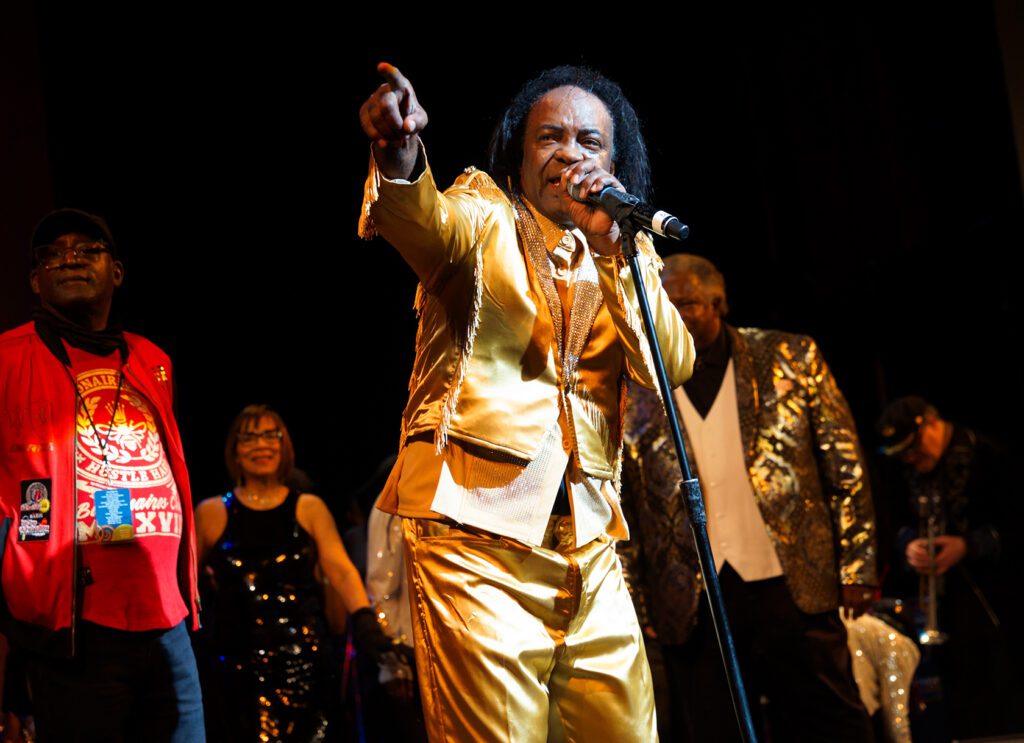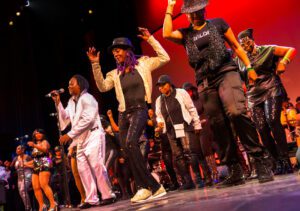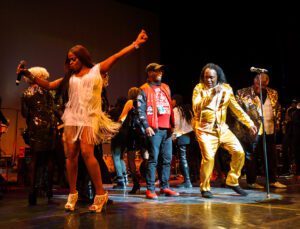
The day after the assassination of Martin Luther King Jr., riots broke out in cities across the U.S. as people took to the streets to protest and mourn the death of the civil rights leader. In Boston, April 5, 1968, looked very different.
Legendary soul singer James Brown had been scheduled to perform at Boston Garden that day. But following King’s murder, then-Mayor Kevin White thought to cancel the concert as rioting broke out in other cities.
“James Brown himself got involved … and said, ‘Mr. Mayor, you don’t want to cancel this concert. And in fact, you really want this concert to happen because you would rather have people listening to my music and being inside versus on your streets, destroying your city,’” said Darryl Settles, president of Catalyst Ventures Development. “And it turned out to be so true because [Boston was] one of the few major cities in the country that did not have a riot. And our city was saved.”

Performers bring down the house at the “James Brown Saves Boston” tribute concert. PHOTO: Courtesy Tony Wilson
On Friday, April 5, 2024, past and present collided when a sort of incarnation of Brown took the stage at the Strand Theatre for a concert commemorating the day Brown saved Boston. Professional entertainer Tony Wilson calls himself not a James Brown impersonator, but a “decoy.” His work as an embodiment of the King of Soul earned Wilson the title of “Young James Brown” many years ago.
Last week, he showed Boston why during the “James Brown Saves Boston” tribute concert that maxed out the 1,400-seat theater. The show featured a bevy of performers, Wilson said, many of them local Bostonians: 20 line dancers, 25 musicians, nine horn players, two bass players, two drummers, a conga player, a keyboard player and 12 singers. And then there was Wilson, clad in a white satin outfit and later a gold silk one, treating the audience to an assortment of Brown’s hits, including “Say It Loud — I’m Black and I’m Proud.”
The Chicago native learned to dance from his sisters. On weekends, the gaggle of kids went straight from grammar school to practice their music and moves, Wilson’s sisters teaching him tap and modern dance, he recalled. Once he incorporated his own flare, Wilson had the recipe for stardom, a gift on full display at the sold-out concert at the Strand Theatre.
Out in the audience, Roxbury resident John Aki DuVal and his wife were watching from the balcony as the musical spectacle unfolded before them.
“We felt blessed to be in the crowd,” said DuVal, adding that he was “really surprised at the number of artists and entertainers they’d taken out to participate.”
DuVal said some of the performers admitted to never having worked together before. It was their first time, and they had done so “because of who James Brown was.” No matter, “they came with their hearts” and “they sang with passion,” said DuVal.
“At some point, I couldn’t help but get up and dance,” said community member Verdaya Mitchell-Brown, who said she spent the entire night tapping her feet to the rhythm in her seat until she simply had to stand. “It was the kind of entertainment that I want to see again,” she said.
The concert was a display of community partnership, with over 15 sponsors, including the Bay State Banner, Catalyst Ventures Development, Embrace Boston and Nubian Square Ascends.
“The tickets sold out right away and … if we had a bigger stadium or arena, we would have had even more people at the event,” said Settles. “And so that proves that people really … love James Brown, love this effort and that they love the message out of the concert itself.”
Brown’s message of Black men and women having “self-respect” has stuck with Settles over the years, he said, and the concert was a much-needed reminder of that sentiment given the “challenging times” he said the country is facing.
The city of Boston’s department of tourism, sports and entertainment also assisted with the organizing and brought 100 older adults to the concert.
“We were excited to partner with members of the community who wanted to see something like this happen,” said the department’s director, John Matthew Borders IV, adding that “we love partnering with people who will have great ideas.”
The concert was somewhat personal for Borders, whose father had shared stories of being a 10-year-old boy at the time of King’s assassination. Borders’ father was born in a time of unrest. Sixty years later, Borders said, there’s still civil unrest. Once again, the concert offered a respite.
“To be able to give people joy, peace, comfort, love and an opportunity to mobilize a moment around soul music, to honor the relationship that the city of Boston has with Dr. King, to honor the role that Boston has played in the music scene nationally and to pay homage to a legend like James Brown with a tribute concert and to make it free and open to the public — it was an ideal scenario,” said Borders.
Asked if the city would consider putting on another show like this in the future, Borders said “Absolutely.” He added that his department is already engaging in conversations “to see if this is something that we can pull off again.”
Most important to Wilson, the Young James Brown is “the message in the music.” The concert, he said, was a reminder to him and to the Boston community that the mom-and-pop shops that pepper the city and their owners would not be here today if the riots had taken hold of Boston the way they did in other parts of the country — all thanks to Brown.







